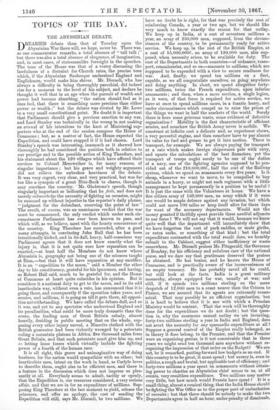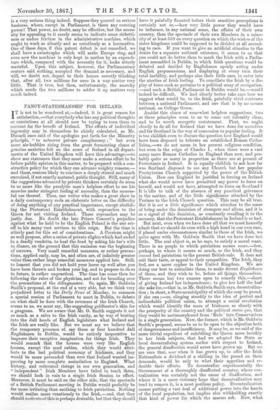TOPICS OF THE DAY.
THE ABYSSINIAN DEBATE. DREARIER debate than that of Tuesday upon the Abyssinian War there will, we hope, never be. There was, as one commentator remarks, a total absence of " tall talk ;" but there was also a total absence of eloquence, of imagination, and, in most cases, of statesmanlike foresight in the speeches. The tone of the House was that of a vestry discussing the lawfulness of a distraint for Church rates, the precise tone which, if the Abyssinian Soulonque understood England and Englishmen, would make him shiver. Mr. Disraeli, who has always a difficulty in being thoroughly parochial, did indeed rise for a moment to the level of his subject, and declare he thought it well that in an age when the pursuit of wealth and power had become absorbing, "the nation should feel as it does feel, that there is something more precious than either power or wealth ;" but the debate was riveted by Mr. Lowe to a very small constitutional point. No doubt it is important that Parliament should give a previous sanction to any war, and Lord Stanley was technically in the wrong in not making an avowal of his intentions to the knot of Ministerii sup- porters who at the end of the session compose the House of Commons ; but, as a matter of fact, the House expected the Expedition, and could have stopped it if it had chosen. Lord Stanley's speech was interesting, inasmuch as it showed how thoroughly he had considered the position both in relation to our prestige and to the possible action of King Theodore, and his statement about the 120 villages which have offered their services to Colonel Merewether is, for many reasons, of singular importance ; but his grave and weighty argument did not relieve the unbroken heaviness of the debate. It was very cogent, very clear, and -Very practical, but was far too like a synopsis of a great Blne-Book to charm, though it may convince the country. Mr. Gladstone's speech, though singularly important as indicating that he feels, and does not merely acknowledge the necessity of fighting on occasion, might be summed up without injustice in the reporter's daily phrase, " judgrnent for the defendant, reserving the point of law." The result, of course, was an unanimous verdict that the war must be commenced, the only verdict which under such cir- cumstances Parliament has ever been known to pass, and which will, as we believe, meet with the hearty concurrence of the country. King Theodore has succeeded, after a good many attempts, in convincing John Bull that he has been intentionally kicked, and in its dull, heavy, half-conscious way Parliament agrees that it does not know exactly what the injury is, that it is not quite sure how reparation can be exacted,—at least half the Members do not know where Abyssinia is, geography not being one of the sciences taught at Eton,—but that it will have reparation at any sacrifice. It is an " expedition to the moon," said a Member the other day to his constituency, grateful for his ignorance, and having, as Robert Hall said, much to be grateful for, and the House of Commons at heart quite coincides in his opinion. But it considers it a national duty to get to the moon, and in its odd inarticulate way, without even a vote, has announced that it is going there, and consequently if the operation takes years, and armies, and millions, it is going on till it gets there, all opposi- tion notwithstanding. We have called the debate dull, and so it was, and yet to any spectator who understood England and its peculiarities, what could be more truly dramatic than the scene, the leading men of Great Britain calmly, almost heavily, deciding in public meeting that on the whole, sup- posing every other injury unreal, a Ninevite clothed with the British guarantee had been violently wronged by a potentate ruling a mountain plateau in Africa, five thousand miles from Great Britain, and that such potentate must give him up, and so letting loose forces which virtually include the fighting power of a fourth of the human race.
It is all right, this grave and unimaginative way of doing business, for the nation would sympathize with no other; but inarticulate men, intent on the work in hand, as Carlyle loves to describe them, ought also to be efficient men, and there is a feature in the discussion which does not impress us plea- santly at all. Everybody seems to admit, tacitly or openly, that the Expedition is, our resources considered, a very serious affair, and that we are in for an expenditure of millions. Sup- posing King Theodore at the last moment to yield, release the prisoners, and offer an apology, the cost of sending the Expedition will still, says Mr. Disraeli, be two millions. We have no doubt he is right, for that was precisely the cost of reinforcing Canada, a year or two ago, but we should like very much to know exactly the reason for that outlay. We keep up in India, at a cost of seventeen millions a.. year, an army of 250,000 men, supposed, from the circum- stances of the country, to be permanently ready for active- service. We keep up, in the rest of the British Empire, at a cost of 15,000,0001., an army of 120,000 men, also sup- posed, when necessity arises, to be available for duty. The- cost of the Departments in both countries—of ordnance, trans- port, commissariat, and so on—amounts to millions, which are- supposed to be expended with a view to secure readiness for war. And, finally, we spend ten millions on a fleet, capable, as we all congratulate ourselves, on going anywhere- and doing anything. In short, we spend altogether forty- two millions, twice the French expenditure, upon inferior- armaments ; and then, when a mere section, a single legion, as it were, of that force is required for active service, we• have at once to spend millions more, in a frantic hurry, and under circumstances which compel us to raise the prices of the things we want in half the markets of the world. Surely there is here some grievous waste, some evidence of defective organization ? Mobility is the first characteristic of efficient armies, and somehow the British Army never is mobile. We. construct at infinite cost a delicate and, as experience shows, a very powerful engine, and then somehow have to pay almost its value for fuel and grease to get it into motion. There is- transport, for example. We are always paying for transport at a rate which makes foreign shipowners pale with envy, and upsets the calculations of the best financiers, yet the transport of troops ought surely to be one of the duties. of a navy, one of the fighting agencies supposed to be pro- vided out of the 210,000,007., half the cost of the Railway system, which we spend on armaments every five years. Is it, cheap, whenever we want to move, to be compelled to buy animals in a hurry, or might not each regiment with a little management be kept permanently in a position to be useful ? It is just the same with the Volunteers at home. We have a., fine citizen army of 160,000 men, an army which if it were one would be ample defence against any invasion, but which could not move 100 miles or keep itself alive for three days for want of the necessary departments. Would not the- money granted if thriftily spent provide these needful adjuncts to our force We will not say that it would, because we know- quite well that the department will immediately show that we have forgotten the cost of pack saddles, or mule girths, or extra socks, or something of that kind ; but the total expenditure contrasted with the total result does, we humbly submit to the Cabinet, suggest either inefficiency or waste somewhere. Mr. Disraeli praises Mr. Fitzgerald; the Governor of Bombay, for his efficiency and sedulous care of the national purse, and we dare say that gentleman deserved the praises he obtained. He has brains, and he knows the House of Commons, and is practically aware of the inconveniences of an empty treasury. He has probably saved all he could, but still look at the facts. India is a great military monarchy, always equipped for war, usually at war, and still, if it spends two millions sterling on the mere despatch of 12,000 men to a coast nearer than the Crimea to France, we are assured that its agents are extremely econo- mical. That may possibly be an efficient organization, but it is hard to believe that it is one with which a Prussian Ministry would be content. That the work will be thoroughly done for the expenditure we do not doubt ; but the ques- tion is, why the enormous annual outlay we are incurring, forty-two millions sterling a year in India and England, does not avert the necessity for any spasmodic expenditure at all ? Suppose a general control of the Empire really belonged, as in theory it does belong, to the Premier, and that the Premier were an organizing genius, is it not conceivable that in three years we might send ten thousand men anywhere without re- cognizing the impression of that order on the Budget? We are not, be it remarked, putting forward low budgets as an end. If this country is to be great, it must spend ; but money is, even in politics, a rough and brutal, but applicable test of efficiency; and forty-two millions a year spent on armaments without obtain- ing power to chastise an Abyssinian chief seems to us, at all events, very resultless expenditure. Two millions may matter very little, but how much would Prussia have spent ? It is a small thing, almost a comical thing, that the India House should be fighting the War Office as to the proper port of • embarkation of recruits ; but that there should be nobody to make the two Departments agree in half an hour, under penalty of dismissals, is a very serious thing indeed. Suppose they quarrel on serious business, where, except in Parliament, is there any coercing power? That power, no doubt, may be effective, but the neces- sity for appealing to it surely seems to indicate some ricketti- ness or undue friction in the administrative machine, which ought to work as silently and as resistlessly as a locomotive. One of these days, if this patent defect is not remedied, we shall have a catastrophe which will make Europe ring, and even now the machine is only kept in motion by an expendi- ture which, compared with the necessity for it, looks utterly wasteful. Upon this subject, however, the Parliamentary orators said nothing, accepted the demand as necessary, and will, we doubt not, depart to their homes secretly thinking that, after all, two millions for once in a. way matter very little. That is true, but then, unfortunately, the anarchy which needs the two millions to solder it up matters very much indeed.



































 Previous page
Previous page